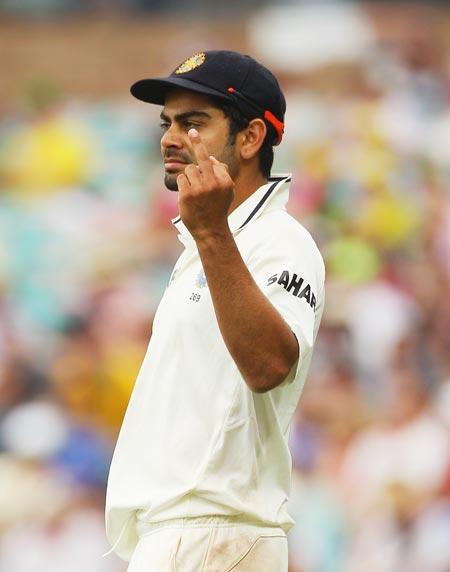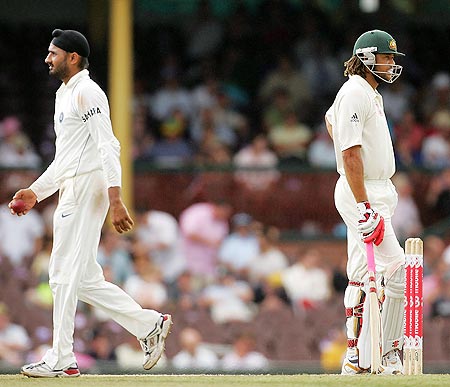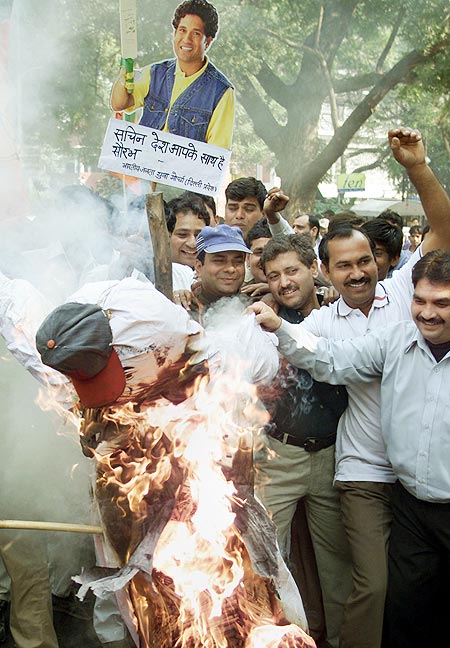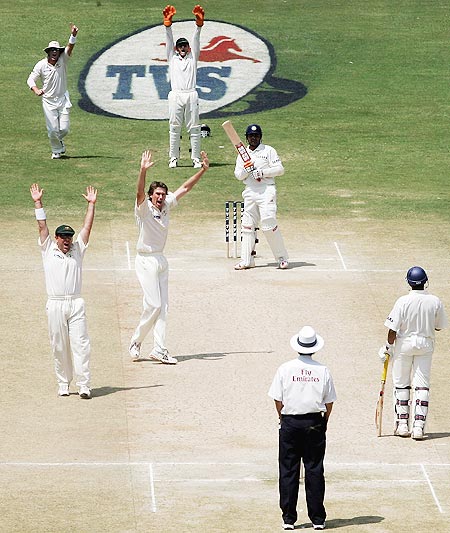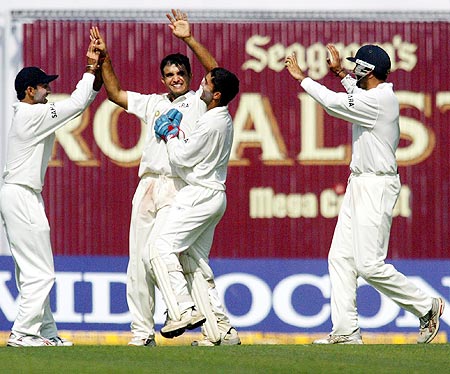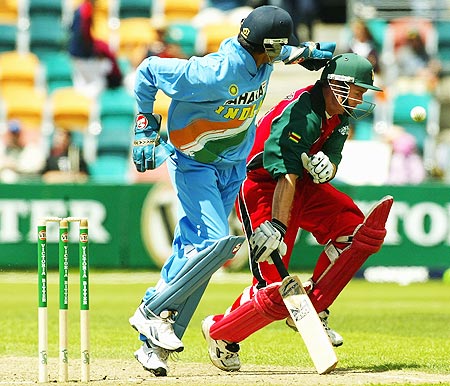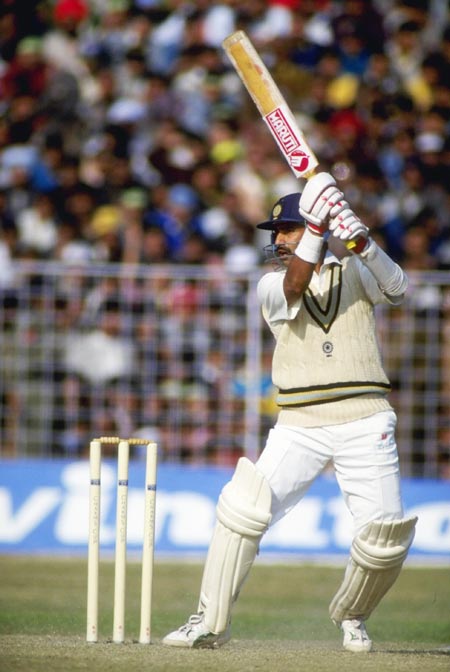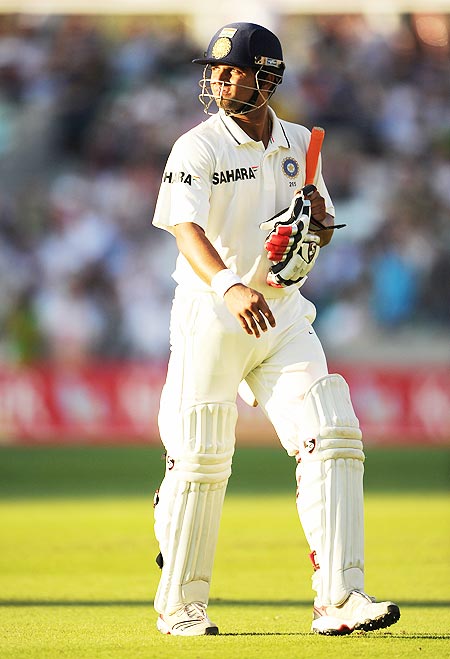 | « Back to article | Print this article |
When Indian cricketers breached the Code
Following Virat Kohli's middle finger gesture in the second Test against Australia, Bikash Mohapatra looks back on instances when Indian cricketers were penalised for their actions on the field.
Middle finger puts Kohli in a mess
Just when one thought an India -- Australia series, for once, would be sans controversy, the Virat Kohli incident has become the first on the ongoing tour.
Kohli was fined half of his match fee in the second Test in Sydney. The young batsman responded to provocation and taunts from the crowd by gesturing at them with his middle finger.
Although Kohli later admitted his mistake, on a micro blogging site, and regretted the same, he couldn't evade punishment.
Match referee Ranjan Madugalle fined him 50 per cent of his match fee for dissent.
The incident was yet another addition to the inglorious list when Indian cricketers were reprimanded for antics on the field. Rediff.com takes a look at a few such instances.
Gambhir's troublesome elbow
It happened during the third Test -- at Ferozshah Kotla -- on Australia's tour of India in 2008.
Gautam Gambhir was caught on television elbowing Shane Watson while taking a run. Subsequently, he was involved in a verbal exchange with both Watson and Simon Katich.
Chris Broad, the ICC referee for the match, charged both Gambhir and Watson with disciplinary offences.
The Australian all-rounder was subsequently fined 10 per cent of his match while the Indian opener was found guilty of a Level 2 charge.
Gambhir was consequently banned for one Test and missed the fourth and final Test of the series in Nagpur.
It was yet another low for the Delhi batsman. The left-hander had been involved in other such incidents earlier in his career, most notably his several altercations with South African Andre Nel and Pakistan's Shahid Afridi
In fact, he was fined 65 per cent of his match fee for an incident in 2007 when he barged into Afridi while batting in an ODI in Kanpur.
Bhajji's monkey business
Continuing with the India -- Australia series, let's come straight to the infamous 'Monkeygate' scandal during the second Test of the India's 2007-08 tour Down Under in Sydney.
It involved Harbhajan Singh and Andrew Symonds in pivotal roles and had a strong supporting cast.
There was a racial vilification charge against Harbhajan after he called Symonds a monkey.
Sachin Tendulkar, one of the prime witnesses in the case, stated during the hearing that his compatriot had merely used a Hindi abuse which sounded like 'monkey'.
The Master Blaster's role in the scandal has been criticised by many former Australian players.
As fate would have it, Tendulkar went on to captain both the players in the IPL, for Mumbai Indians.
Denness a menace for Tendulkar
Another major controversy involving Sachin Tendulkar was the 'Mike Denness affair.'
During the second Test, at St George's Park (Port Elizabeth), of India's ill-fated 2001 tour of South Africa, Denness suspended the Master Blaster for alleged ball tampering.
Besides, there were five other Indian players, including captain Sourav Ganguly, Virender Sehwag, Harbhajan Singh, Shiv Sundar Das and Deep Dasgupta, labeled guilty of various offences.
Following protests from various quarters, the ICC rescinded the one-match ban imposed on both Tendulkar and Ganguly. However, it did uphold the ban on Sehwag for the subsequent Test, one that was deemed "unofficial" by the governing body.
Sehwag was eventually dropped from the team for the first Test in India's subsequent series against England.
Meanwhile, Denness was barred by the United Cricket Board of South Africa from entering the venue for the third Test.
Sehwag's slip
Another incident involving Virender Sehwag was in October 2004. The swashbuckling opener was fined 65 per cent of his match fee by ICC match referee Ranjan Madugalle after being found guilty of violating section 2.2 of the Code of Conduct.
The charge against Sehwag, pertaining to show of serious dissent on the field, was brought by umpires Billy Bowden and Steve Bucknor during the opening Test of Australia's tour of India at the Chinnaswamy stadium (Bangalore) in 2004.
The incident that initiated Sehwag's reaction came early in India's second innings during the fourth day's play when Bowden adjudged him out leg before off Glenn McGrath when there had been a clear inside edge. While walking back to the pavilion, the batsman said something to the umpire that caught the eye of the officials.
To his credit, Sehwag pleaded guilty at the disciplinary hearing that was held at the end of the day's play.
Dadagiri did not pay
This one involved Sourav Ganguly.
During the fourth day of the second Test against South Africa at Eden Gardens in December 2004, the then Indian captain was found guilty of showing serious dissent to the umpire.
Reportedly, Ganguly was seen making gestures at umpire Daryl Harper after the latter turned down an appeal for bat-pad catch against Jacques Kallis in South Africa's second innings.
The television replays proved Ganguly was right. There was a thick inside edge from Kallis off Harbhajan Singh. However, the Indian captain had to pay the price.
Jeff Crowe, the ICC match referee, fined him 30 per cent of his match.
Lozenge turns bitter for Dravid
Many might find this one surprising.
But it did happen.
During a match against Zimbabwe in the Commonwealth Bank Series in Brisbane (in 2004), Rahul Dravid was found guilty of ball tampering.
Television footage conclusively showed Dravid intentionally applying a lozenge to the ball during the Zimbabwean innings at the Gabba.
Match referee Clive Lloyd concluded it was in breach of clause 2.10 of the ICC's Code of Conduct.
Dravid was fined 50 per cent of his match fee.
Prabhakar-Mongia got it wrong
This instance might be the only one of its kind.
It happened during West Indies' 46-run win over India in Kanpur in October 1994.
Chasing 257 to win, the home team was comfortably-placed at 195 for 5 in the 42nd over, needing just 63 runs off the final nine overs.
They scored just 16 more as the sixth-wicket pair of Manoj Prabhakar and Nayan Mongia applied the brakes.
The duo were dropped from the rest of the series while Raman Subba Row, the ICC referee, docked India two points.
His decision was later rescinded by ICC, who said it was not in his jurisdiction.
Later, Prabhakar was quoted as saying to the then selection committee chairman Gundappa Vishwanath that there weren't "instructions from the dressing room to speed things up".
Got the drift?
Raina's exercise in futility
This one is a more recent incident.
In June last year, the ICC fined Suresh Raina 25 per cent of his match fees for showing dissent over his dismissal on the opening day of the second Test against the West Indies at the Kensington Oval (Bridgetown).
The incident took place when the left-handed batsman was caught off the bowling of Devendra Bishoo.
Raina shook his head to indicate that he did not hit the ball, something which seemed to be an attempt to influence the umpire's decision. On being given out, he picked his bat up from the ground and swung it at the dirt.
Raina was guilty of breaching Level 1 of the ICC Code of Conduct. Later, he pleaded guilty and accepted the fine imposed on him by match referee Chris Broad.
